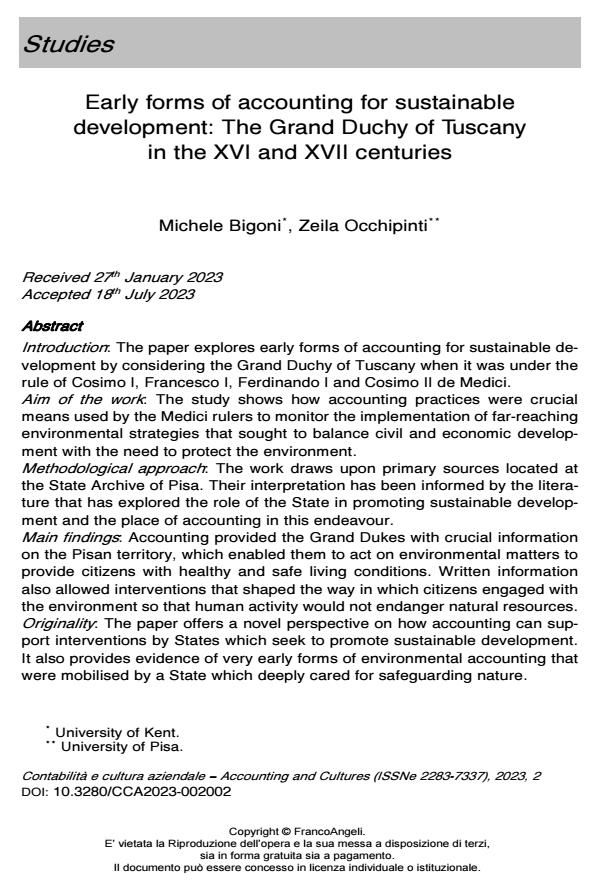Early forms of accounting for sustainable development: The Grand Duchy of Tuscany in the XVI and XVII centuries
Titolo Rivista CONTABILITÀ E CULTURA AZIENDALE
Autori/Curatori Michele Bigoni, Zeila Occhipinti
Anno di pubblicazione 2024 Fascicolo 2023/2
Lingua Inglese Numero pagine 25 P. 9-33 Dimensione file 139 KB
DOI 10.3280/CCA2023-002002
Il DOI è il codice a barre della proprietà intellettuale: per saperne di più
clicca qui
Qui sotto puoi vedere in anteprima la prima pagina di questo articolo.
Se questo articolo ti interessa, lo puoi acquistare (e scaricare in formato pdf) seguendo le facili indicazioni per acquistare il download credit. Acquista Download Credits per scaricare questo Articolo in formato PDF

FrancoAngeli è membro della Publishers International Linking Association, Inc (PILA), associazione indipendente e non profit per facilitare (attraverso i servizi tecnologici implementati da CrossRef.org) l’accesso degli studiosi ai contenuti digitali nelle pubblicazioni professionali e scientifiche.
Introduction: The paper explores early forms of accounting for sustainable development by considering the Grand Duchy of Tuscany when it was under the rule of Cosimo I, Francesco I, Ferdinando I and Cosimo II de Medici. Aim of the work: The study shows how accounting practices were crucial means used by the Medici rulers to monitor the implementation of far-reaching environmental strategies that sought to balance civil and economic development with the need to protect the environment. Methodological approach: The work draws upon primary sources located at the State Archive of Pisa. Their interpretation has been informed by the literature that has explored the role of the State in promoting sustainable development and the place of accounting in this endeavour. Main findings: Accounting provided the Grand Dukes with crucial information on the Pisan territory, which enabled them to act on environmental matters to provide citizens with healthy and safe living conditions. Written information also allowed interventions that shaped the way in which citizens engaged with the environment so that human activity would not endanger natural resources. Originality: The paper offers a novel perspective on how accounting can support interventions by States which seek to promote sustainable development. It also provides evidence of very early forms of environmental accounting that were mobilised by a State which deeply cared for safeguarding nature.
Parole chiave:accounting, sustainability, Grand Duchy of Tuscany, power, state, Pisa.
- Diversity and Equity in Accounting Zeila Occhipinti, Salvatore Tallarico, Roberto Verona, pp.139 (ISBN:978-3-031-78246-6)
- Institutional pressures, business model innovations and accounting evidence: the case of the Opera di Santa Maria del Fiore in Florence during the sixteenth century Giacomo Manetti, Carmela Nitti, Marco Bellucci, in Accounting History Review /2025 pp.171
DOI: 10.1080/21552851.2025.2462334
Michele Bigoni, Zeila Occhipinti, Early forms of accounting for sustainable development: The Grand Duchy of Tuscany in the XVI and XVII centuries in "CONTABILITÀ E CULTURA AZIENDALE" 2/2023, pp 9-33, DOI: 10.3280/CCA2023-002002